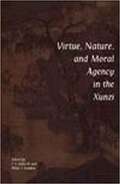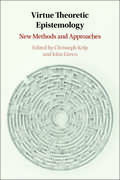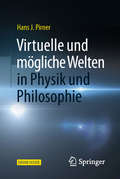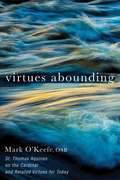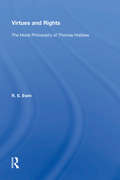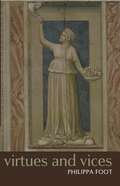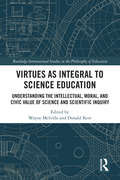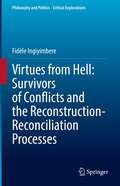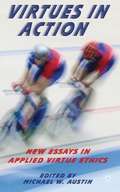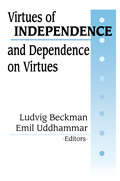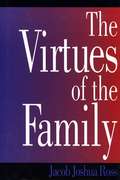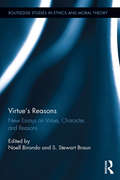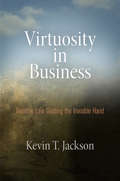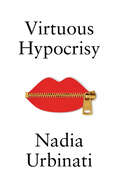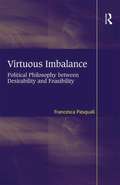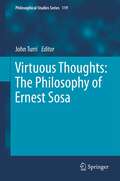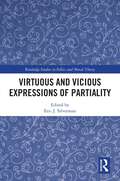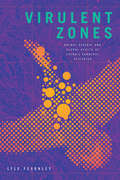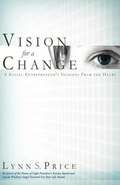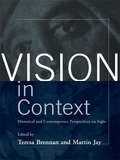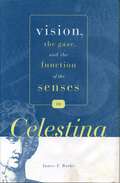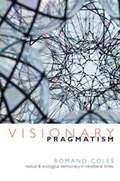- Table View
- List View
Virtue, Nature, and Moral Agency in the Xunzi
by Philip J. Ivanhoe T. C. KlineXunzi is traditionally identified as the third philosopher in the Confucian tradition, after Confucius and Mencius. Unlike the work of his two predecessors, he wrote complete essays in which he defends his own interpretation of the Confucian position and attacks the positions of others. Within the early Chinese tradition, Xunzi's writings are arguably the most sophisticated and philosophically developed. This richness of philosophical content has led to a lively discussion of his philosophy among contemporary scholars. This volume collects some of the most accessible and important contemporary essays on the thought of Xunzi, with an Introduction that provides historical background, philosophical context, and relates each of the selections to Xunzi's philosophy as a whole and to the themes of virtue, nature, and moral agency. These themes are also discussed in relation to Western philosophical concerns.
Virtue-Theoretic Epistemology: New Methods and Approaches
by Christoph Kelp John GrecoVirtue epistemology is one of the most flourishing research programmes in contemporary epistemology. Its defining thesis is that properties of agents and groups are the primary focus of epistemic theorising. Within virtue epistemology two key strands can be distinguished: virtue reliabilism, which focuses on agent properties that are strongly truth-conducive, such as perceptual and inferential abilities of agents; and virtue responsibilism, which focuses on intellectual virtues in the sense of character traits of agents, such as open-mindedness and intellectual courage. This volume brings together ten new essays on virtue epistemology, with contributions to both of its key strands, written by leading authors in the field. It will advance the state of the art and provide readers with a valuable overview of what virtue epistemology has achieved.
Virtuelle und mögliche Welten in Physik und Philosophie
by Hans J. PirnerWas sind mögliche Welten und was haben Entwicklungen der modernen Physik mit Ideen über mögliche Welten in der Philosophie zu tun? In der Beantwortung dieser Fragen entwickelt das vorliegende Werk das wissenschaftliche Weltbild im Vergleich mit möglichen Welten und gelangt so zu einem besseren Verständnis unserer einzigen wirklichen Welt. Dazu beschreibt der Autor die kreativen Ideen, die zur klassischen Physik, zur Quantenphysik und zur Erforschung des Ursprungs des Weltalls geführt haben. Er lädt den Leser ein, mit ihm über die Versuche in der modernen Physik nachzudenken, Parallelwelten und neue Universen einzuführen. Man erfährt, wie in Physik und Philosophie mögliche Welten als Instrumente verwendet werden, um unsere Erkenntnisse zu erweitern. Es wird erläutert, wie man sich mögliche Welten auch außerhalb der Physik vorzustellen hat und welchen Anforderungen diesen genügen. Unter diesem Gesichtspunkt analysiert der Autor abschließend die Zukunftsvisionen der Science-Fiction Literatur und die neuesten Erkenntnisse über künstliche, virtuelle und hybride Welten. Anhänge mit vertieftem physikalischen Hintergrund und ein ausführliches Glossar unterstützen die interessierten Lesern und Leserinnen dabei, einen Überblick über die vielfältigen Begriffe und Sachverhalte zu behalten.
Virtues Abounding: St. Thomas Aquinas On the Cardinal and Related Virtues for Today
by Mark O'KeefeThis book explores, in contemporary language, the practical insights that Aquinas offers for the moral life today. Whether in university, seminary, or adult faith formation settings—whether for a deeper intellectual understanding of virtues or for personal reflection and growth—Virtues Abounding will provide new insight into a classic but too often overlooked storehouse of moral riches.
Virtues And Rights: The Moral Philosophy Of Thomas Hobbes
by R. E. EwinThis book is a timely interpretation of the moral and political philosophy of Thomas Hobbes. Staying close to Hobbes's text and working from a careful examination of the actual substance of the account of natural law, R. E. Ewin argues that Hobbes well understood the importance of moral behavior to civilized society. This interpretation stands as a much-needed corrective to readings of Hobbes that emphasize the rationally calculated, self-interested nature of human behavior. It poses a significant challenge to currently fashionable game theoretic reconstructions of Hobbesian logic. It is generally agreed that Hobbes applied what he took to be a geometrical method to political theory. But, as Ewin forcefully argues, modem readers have misconstrued Hobbes's geometric method, and this has led to a series of misunderstandings of Hobbes's view of the relationship between politics and morality. Important implications of Ewin's reading are that Hobbes never thought that "the war of each against all" was an empirical possibility for citizens; that his political theory actually presupposes moral agency; and that Hobbes's account of natural law forces us to the conclusion that Hobbes was a virtue theorist. This major contribution to Hobbes studies will be praised and criticized, welcomed and challenged, but it cannot be ignored. All philosophers, political theorists, and historians of ideas dealing with Hobbes will need to take account of it.
Virtues and Vices and Other Essays in Moral Philosophy
by Philippa FootPhilippa Foot is regarded as standing out among contemporary ethical theorists because of her conviction that virtues and vices are more central ethical notions than rights, duties, justice, or consequences. This book collects 12 of her essays published between 1957-77 and two new ones. This collection of essays contains discussions of the moral philosophy of David Hume, Immanuel Kant, Friedrich Nietzsche, and some modern philosophers. It presents virtues and vices rather than rights and duties as the central concepts in moral philosophy. Throughout, the author rejects contemporary anti‐ naturalistic moral philosophies such as emotivism and prescriptivism, but defends the view that moral judgements may be hypothetical rather than (as Kant thought) categorical imperatives. The author also applies her moral philosophy to the current debates on euthanasia and abortion, the latter discussed in relation to the doctrine of the double effect. She argues against the suggestion, on the part of A. J. Ayer and others, that free will actually requires determinism. In a final essay, she asks whether the concept of moral approval can be understood except against a particular background of social practices.
Virtues as Integral to Science Education: Understanding the Intellectual, Moral, and Civic Value of Science and Scientific Inquiry (Routledge International Studies in the Philosophy of Education)
by Wayne Melville; Donald KerrBy investigating the re-emergence of intellectual, moral, and civic virtues in the practice and teaching of science, this text challenges the increasing professionalization of science; questions the view of scientific knowledge as objective; and highlights the relationship between democracy and science. Written by a range of experts in science, the history of science, education and philosophy, the text establishes the historical relationship between natural philosophy and the Aristotelian virtues before moving to the challenges that the relationship faces, with the emergence, and increasing hegemony, brought about by the professionalization of science. Exploring how virtues relate to citizenship, technology, and politics, the chapters in this work illustrate the ways in which virtues are integral to understanding the values and limitations of science, and its role in informing democratic engagement. The text also demonstrates how the guiding virtues of scientific inquiry can be communicated in the classroom to the benefit of both individuals and wider societies. Scholars in the fields of Philosophy of Science, Ethics and Philosophy of Education, as well as Science Education, will find this book to be highly useful.
Virtues from Hell: Survivors of Conflicts and the Reconstruction-Reconciliation Processes (Philosophy and Politics - Critical Explorations #20)
by Fidèle IngiyimbereThis book offers a critical examination of certain ideas and values—such as remembering, forgiveness, story-telling through Truth and Reconciliation Commissions, etc.—that under-gird the transitional practices and mechanisms of societies emerging from conflicts. It does so by making the survivors’ experience the supreme and ultimate judge of the legitimacy of such practices. While many scholars have dealt with these topics, this book provides a unique perspective on them by using personal stories, narratives and memoirs of the survivors as a checking point of the theoretical elaboration of these ideas and values. By means of an existential phenomenological analysis of the situation of survivors of gross human rights violations, the book assesses how many resources are still available to them, so that they can contribute to the processes of reconstruction and reconciliation of their societies. This analysis constitutes the background for reading the rest of the book, which challenges some assumptions and presumptions of transitional practices such as healing through truth-telling, or providing justice through reparations. It does so by presenting nuanced suggestions on the ways survivors can participate in the reconstruction-reconciliation processes, without jeopardizing their own well-being.
Virtues in Action
by Michael W. AustinIn recent decades, many philosophers have considered the strengths and weaknesses of a virtue-centered approach to moral theory. Much less attention has been given to how such an approach bears on issues in applied ethics. The essays in this volume apply a virtue-centered perspective to a variety of contemporary moral issues, and in so doing offer a fresh and illuminating perspective. Some of the essays focus on a particular virtue and its application to one or more realms of applied ethics, such as temperance and sex or humility and environmental ethics. Other chapters focus on an issue in applied ethics and bring several virtues into a discussion of that issue or realm of life, such as sport, education, and business. Finally, several of the chapters engage relevant psychological research as well as current neuroscience, which enhances the strength of the philosophical arguments.
Virtues of Independence and Dependence on Virtues
by Ludvig Beckman Emil UddhammarDebate about the concept of virtue is a persistent theme in academic discourse. One strand of thinking attempts to examine and reconstruct ethical theories with the aim of formulating a new morality or ethics. A second strand of thought, more strongly represented in this work, attempts to explore the social and political world deploying the concept of virtue. Thus, this volume crosses the established borders of academic disciplines in order to provide a richer and more comprehensive understanding of the place of virtues in contemporary western societies.The editors hold that the dominating virtue of our culture and society is the virtue of independence. Yet independence, or individual autonomy, is contingent upon a diverse, and so far ill-understood, set of cultural, biological, economic, ethical, and political practices. The idea of individuality is in other words supervening on a web of formal and informal relations. This volume therefore attempts to improve our understanding of the prevailing ethos of independence as well as of the mechanisms and practices sustaining it.Virtues are examined in specific contexts. Authors explore what we can learn about our dependence on virtues from the archaic Greek culture. They examine the relevance of virtue-ethics to the understanding of day-to-day practices. And they look at the place of virtues in understanding the norms of independence and liberty. Other contributions attend to the virtues of independence and its challenges, examining possible philosophical challenges, questioning whether independence is always a virtue, and how the virtues of justice fare given a commitment to the virtues of independence.The final portion of the book explore the empirical consequences of the virtues of independence. Among the questions addressed are how personal independence affects political and economic institutions, and the connections between norms of independence and the growth of modernity. This volume is an important contribution to contemporary understanding of what constitutes virtuous and ethical behavior.
Virtues of The Mind
by Linda Trinkaus ZagzebskiAlmost all theories of knowledge and justified belief employ moral concepts and forms of argument borrowed from moral theories, but none of them pay attention to the current renaissance in virtue ethics. This remarkable book is the first attempt to establish a theory of knowledge based on the model of virtue theory in ethics. The book develops the concept of an intellectual virtue, and then shows how the concept can be used to give an account of the major concepts in epistemology, including the concept of knowledge. This highly original work of philosophy for professionals will also provide students with an excellent introduction to epistemology, virtue theory, and the relationship between ethics and epistemology.
Virtues of Thought
by Aryeh KosmanVirtues of Thought is an excursion through interconnecting philosophical topics in Plato and Aristotle, under the expert guidance of Aryeh Kosman. Exploring what these two foundational figures have to say about the nature of human awareness and understanding, Kosman concludes that ultimately the virtues of thought are to be found in the joys and satisfactions that come from thinking philosophically, whether we engage in it ourselves or witness others' participation. Kosman examines Aristotle's complex understanding of the role that reason plays in practical choice and moral deliberation, and the specific forms of thinking that are involved in explaining the world and making it intelligible to ourselves and others. Critical issues of consciousness and the connection between thinking and acting in Aristotle's philosophical psychology lead to a discussion of the importance of emotion in his theory of virtue. Theories of perception and cognition are highlighted in works such as Aristotle's Posterior Analytics. When his focus turns to Plato, Kosman gives original accounts of several dialogues concerning Plato's treatment of love, self-knowledge, justice, and the complex virtue known as sophrosyne in such texts as Charmides and the Republic. Bringing together in a single volume previously unpublished essays along with classics in the field, Virtues of Thought makes a significant contribution to our study of ancient Greek philosophy.
Virtues of the Family
by Jacob Joshua RossSince the sexual revolution, the traditional family's moral authority has been the subject of an increasingly politicized debate. The family's detractors have viewed it as an arbitrary social arrangement which perpetuates injustice and legitimates violations of individual rights. Those who defend it, on the other hand, insist that it is the only possible source of human values and suggest that those outside it are somehow deficient or deviant. In this strident and polarized atmosphere, philosopher Jacob Joshua Ross offers a long-overdue assessment of the family's relation to morality, arguing that the family is not a rigid, static institution with inflexible codes of behavior, but rather a dynamic social structure from which human morality - and human nature - emerge. Ross first explores the foundations of ethical belief, maintaining that the traditional family is intimately linked to the evolution of human morality in societies throughout the world. While he accepts the relativity of moral codes, Ross defends "true" or rational morality as the minimal and universal code on which all families depend - a code which has evolved as a result of the needs and constraints of our shared humanity, and on which all societies may one day hope to agree. Ross applies this view to many of the sensitive issues confronting today's families, such as divorce and single parenthood, adoption, surrogacy, and gay marriage. He asserts that although many people, for practical reasons, feel compelled today to seek answers outside the traditional family, this does not undermine the family's moral authority. On the contrary, Ross defends the traditional conception of the family against those who perceive parents as mere "caretakers" of children, arguing that concepts such as intergenerational loyalty, sexual exclusivity between husband and wife, and the duty to educate and nurture one's children evolve naturally from the unique relationships which develop among family members - relationships which are irreducible to questions of rights and entitlements.
Virtues, Democracy, and Online Media: Ethical and Epistemic Issues (Routledge Studies in Ethics and Moral Theory)
by Nancy E. Snow Maria Silvia VaccarezzaThis book addresses current threats to citizenship and democratic values posed by the spread of post-truth communication. The contributors apply research on moral, civic, and epistemic virtues to issues involving post-truth culture. The spread of post-truth communication affects ordinary citizens’ commitment to truth and attitudes toward information sources, thereby threatening the promotion of democratic ideals in public debate. The chapters in this volume investigate the importance of helping citizens improve the quality of their online agency and raise awareness of the risks social media poses to democratic values. This book moves from two initial chapters that provide historical background and overview of the present post-truth malaise, through a series of chapters that feature mainly diagnostic accounts of the epistemic and ethical issues we face, to the complexities of virtue-theoretic analyses of specific virtues and vices. Virtues, Democracy, and Online Media will be of interest to scholars and advanced students working in virtue ethics, epistemology, political philosophy, and media studies.
Virtue’s Reasons: New Essays on Virtue, Character, and Reasons (Routledge Studies in Ethics and Moral Theory)
by Noell Birondo S. Stewart BraunVirtues and reasons are two of the most fruitful and important concepts in contemporary moral philosophy. Many writers have commented upon the close connection between virtues and reasons, but no one has done full justice to the complexity of this connection. It is generally recognized that the virtues not only depend upon reasons, but also sometimes provide them. The essays in this volume shed light on precisely how virtues and reasons are related to each other and what can be learned by exploring this relationship. Virtue’s Reasons is divided into three sections, each of them devoted to a general issue regarding the relationship between virtues and reasons. The first section analyzes how the virtues may be related to, or linked with, normative reasons in ways that improve our understanding of what constitutes virtuous character and ethical agency. The second section explores the reasons moral agents have for cultivating the virtues and how the virtues impact moral responsiveness or development. The final section examines how reasons can be employed in understanding the nature of virtue, and how specific virtues, like modesty and practical wisdom, interact with reasons. This book will be of major interest to scholars working on virtue theory, the nature of moral character, and normative ethics.
Virtuosity in Business
by Kevin T. JacksonThe recent global financial crisis raises pressing issues that are not exclusively economic. The health of the economy, Kevin T. Jackson contends, reflects the moral health of the wider culture: ethics must be considered along with economics to understand world markets, especially now that globalization and other forces have increasingly complicated the regulation of transnational corporate conduct. Virtuosity in Business calls on businesspeople and ethicists to expand their thinking by stressing the profound relevance of philosophy to business and economics.Virtuosity in Business shows that ethics has been the overriding problem for business and that it is the only enduring solution. Drawing on a variety of philosophical sources, including Aristotle, Thomas Aquinas, and Jean-Paul Sartre, Jackson applies the concept of virtue to the competitive realm of the marketplace. Virtuosity, in all realms of human endeavor, is not merely a display of technical skill or adherence to conventional norms. The invisible law of virtuosity, which discourages misconduct and rewards good corporate citizenship, guides ethical firms and wise entrepreneurs toward greater success by playing a constructive part in the human enterprise.A pioneering work in the contemporary philosophy of business, Virtuosity in Business revivifies business ethics to address concerns arising from the global financial crisis, such as restoration of faith in the market, respect for human rights, and environmental sustainability.
Virtuous Hypocrisy
by Nadia UrbinatiSpeak your mind, always. Hypocrisy challenges this rule of authenticity, and for this very reason hypocrisy is judged negatively, as intentional inconsistency between thoughts and words, between belief and behaviour. Does this make the hypocrite a silent saboteur of the moral order? A person who hides in the shadows and erodes the foundations of trust? Without trust there is no society, no friendship, no love. But is hypocrisy always reprehensible? Nadia Urbinati argues that society, friendship and love all require a measure of hypocrisy – what she calls ‘virtuous hypocrisy’. If we were always uncompromisingly honest in public, it would be a disaster for everyone. Sometimes it is better to refrain from speaking your mind: hypocrisy can be a form of civility and a sign of maturity and autonomy. And in politics too, a degree of hypocrisy and inconsistency is essential. The important thing is to understand when and within what limits hypocrisy can be justified, and to avoid it becoming systematic and leading to outright lying and deception. Urbinati does not praise hypocrisy unconditionally but argues that a degree of hypocrisy is essential to the smooth functioning of our social and political life. This perceptive reappraisal of a much-maligned concept will be of interest to students and academics in politics and political theory and to a wide general readership.
Virtuous Imbalance: Political Philosophy between Desirability and Feasibility
by Francesca PasqualiWhich kind of methodology should political philosophy endorse to jointly meet its theoretical and practical commitments? Virtuous Imbalance: Political Philosophy between Desirability and Feasibility assesses three paradigmatic cases to explore and explain political philosophy's attempts to answer this important question. Rawls's realistic utopianism, Machiavelli's realism, and Plato's utopianism are examined and explored as Francesca Pasquali presents the proper methodology political philosophy should endorse when attempting to attain equilibrium between the practical and the theoretical. These models are investigated with reference to desirability and feasibility; the former concerning the adequacy of normative principles, the latter the practical possibility of enacting them. Both realism and utopianism are shown to perform important and relevant functions with utopianism providing the criteria for judging political practices and realism developing principles for orienting political actors' conduct. An innovative version of realistic utopianism develops, avoiding the shortfalls detected in previous formulations whilst presenting a methodological strategy that enables political philosophy to play a proper public role, without dismissing theoretical concerns.
Virtuous Thoughts: The Philosophy of Ernest Sosa
by John TurriThis collection is a major contribution to the understanding and evaluation of Ernest Sosa's profound and wide-ranging philosophy, in epistemology and beyond. A balanced, fair and critical volume, it offers a sensitive appreciation of his wide philosophical purview, a nuanced assessment of the detail of his thought, and a spur to exploring the linkages between the varied topics explored by the subtle mind of this great American scholar. The papers explore a wealth of Sosa's academic interests, including his work on philosophical method, the philosophy of mind and language, metaphysics, and value theory, in addition to his output on epistemology itself. It offers, for example, a rebuttal of the counterarguments to Sosa's reliabilist theory of introspective justification, which itself concludes with some objections to Sosa's stated views on the 'speckled hen' problem. Other authors track the connections of his virtue theory to his advocacy of bi-level epistemology, provide reflections on Sosa's views on the epistemological tradition, and examine the nexus of his beliefs on intuition and philosophical methodology. This volume is an insightful reckoning of Sosa's academic account.
Virtuous and Vicious Expressions of Partiality (Routledge Studies in Ethics and Moral Theory)
by Eric J. SilvermanThis volume gathers essays from leading scholars to discuss partiality in ethics. The chapters examine the virtuous and vicious ways in which we relate to those close to us. There has long been a puzzle in ethics concerning the balance between our general moral obligations to everyone and our specific moral obligations to a smaller subset of people: our family, our nation, and our friends. There has been longstanding tension between the moral intuition that equality entails that we have the same moral duties to everyone and the moral intuition that special obligations entail that we have much greater duties to those close to us. The chapters in this volume discuss varying perspectives on partiality within a wide range of relationships. Section 1 offers overarching visions of partiality. Section 2 examines how roles and relationships might shape partiality. Section 3 focuses on the potential moral dangers and pitfalls of partiality. Finally, Section 4 looks at specific applications of partiality expressed as our loyalty to country, religion, sports teams, and employers. Virtuous and Vicious Expressions of Partiality will be of interest to scholars and advanced students working in ethics, social and political philosophy, and philosophy of religion.
Virulent Zones: Animal Disease and Global Health at China's Pandemic Epicenter (Experimental Futures)
by Lyle FearnleyScientists have identified southern China as a likely epicenter for viral pandemics, a place where new viruses emerge out of intensively farmed landscapes and human--animal interactions. In Virulent Zones, Lyle Fearnley documents the global plans to stop the next influenza pandemic at its source, accompanying virologists and veterinarians as they track lethal viruses to China's largest freshwater lake, Poyang Lake. Revealing how scientific research and expert agency operate outside the laboratory, he shows that the search for origins is less a linear process of discovery than a constant displacement toward new questions about cause and context. As scientists strive to understand the environments from which the influenza virus emerges, the unexpected scale of duck farming systems and unusual practices such as breeding wild geese unsettle research objects, push scientific inquiry in new directions, and throw expert authority into question. Drawing on fieldwork with global health scientists, state-employed veterinarians, and poultry farmers in Beijing and at Poyang Lake, Fearnley situates the production of ecological facts about disease emergence inside the shifting cultural landscapes of agrarian change and the geopolitics of global health.
Vision for a Change: A Social Entrepreneur's Insights from the Heart
by Lynn S. PriceA thought-provoking, problem-solving blend of relatable stories that serve as the catalyst for change and sustainability. The laser-sharp focus regarding ideas, entrepreneurial skills, impact and I-ethical fiber introduces powerful and compelling leadership lessons.
Vision in Context: Historical and Contemporary Perspectives on Sight
by Martin Jay Teresa BrennanVision and the gaze are key issues in the analysis of racism, sexism and ethnocentrism. In recent radical theory, generally, and French theory in particular, vision has been seen as a means of control. But this view is often unnuanced. It bypasses questions such as: Why is it that contemporary theories have been so critical of vision, and generous towards listening (in psychoanalysis) and language (in philosophy)? This collection of original essays brings together historical studies and contemporary theoretical perspectives on vision. The historical papers focus in turn on Ancient Greece, medieval theology, the Renaissance, the Enlightenment and the nineteenth century. These historical studies are themselves thoroughly informed by poststructuralist theory. They provide a rigorous background for several new, exciting articles on vision and its bearings for feminism, race, sexual orientation, film and art. This collection is the first of its kind in juxtaposing historical and contemporary
Vision, the Gaze, and the Function of the Senses in “Celestina” (Studies in Romance Literatures)
by James F. BurkeThe plot of the late-medieval Spanish work Celestina (1499) centers on the ill-fated love of Calisto and Melibea and the fascinating character of their intermediary, Celestina. In this ground-breaking rereading of the play, James F. Burke offers a new interpretation of the characters' actions by analyzing medieval theories of perception that would have influenced the composition of Celestina. Drawing upon a variety of texts and thinkers—including the medieval theories of Thomas Aquinas, the Renaissance treatises of Marsilio Ficino, the classical philosophy of Aristotle, and the modern psychology of Jacques Lacan—Burke relates ancient and medieval theories of sensory functions to modern understandings. He demonstrates that modern concepts of "the gaze" have their premodern analogy in the idea of an all-encompassing sensory field, both visual and auditory, that surrounded and enveloped each individual. Touching on medieval theories of the "evil eye," the sonic sphere, and "the banquet of the senses," Burke offers a new perspective on the use and manipulation of sensory input by the characters of Celestina. This book will be welcomed not only by students of Spanish literature but also by those interested in new ways of approaching medieval and Renaissance texts.
Visionary Pragmatism: Radical and Ecological Democracy in Neoliberal Times
by Romand ColesAs neoliberal capitalism destroys democracy, commonwealth, and planetary ecology, the need for radically rethinking and generating transformative responses to these catastrophes is greater than ever. Given that, Romand Coles presents an invigorating new mode of scholarship and political practice he calls "visionary pragmatism." Coles explores the profound interrelationships among everyday micropractices of grassroots politics and pedagogy, institutional transformation, and political protest through polyfocal lenses of political and social theory, neuroscience research, complex systems theory, and narratives of his cutting-edge action research. Visionary Pragmatism offers a theory of revolutionary cooptation that, in part, selectively employs practices and strategies of the dominant order to radically alter the coordinates of power and possibility. Underscoring the potential, vitality, and power of emerging democratic practices to change the world, Visionary Pragmatism's simultaneous theoretical rigor and grounding in actual political and ecological practices provokes and inspires new ways of cocreating knowledge and action in dark times.
